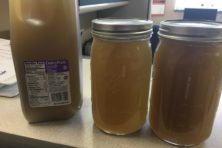State News: Study Finds Human Waste Contaminating Wells
- Share
- Tweet
- Pin
- Share
New data from a groundwater study in southwestern Wisconsin show that septic systems are contributing to water-quality problems for rural residents.
The Southwestern Wisconsin Groundwater and Geology study started in 2018 and has since tested hundreds of private wells in Grant, Iowa and Lafayette counties. Its first phase tested wells for bacteria or nitrates, a compound linked to a variety of health problems. The first round found that 42 percent of wells exceeded health standards, and a second round found that 27 percent were contaminated.
Now in the study’s second phase, the latest round of water samples were collected in August from 34 wells that were found to be contaminated in phase one.
Researchers found fecal contamination in 25 of the selected wells and analyzed the microbes to determine the source of the waste. Fourteen wells had microbes indicating the presence of human fecal matter, with two wells also testing positive for microbes from cattle or other ruminant feces. A total of seven wells had ruminant microbes, with one also testing positive for microbes from pig feces.
Natural Resources Board Approves Manure Restrictions
The state’s Natural Resources Board recently gave the Wisconsin Department of Natural Resources the green light to begin crafting rules that would restrict manure spreading in areas with soils that are susceptible to groundwater contamination.
The approval marks the beginning of a lengthy process that will include forming a technical advisory committee to evaluate which areas are sensitive to groundwater pollution. The agency has 30 months to draft a rule and send it to the Legislature for approval.
Fred Prehn, board chair, said members had previously “stuck (their) necks out” when they approved implementing restrictions across 15 counties in northeastern Wisconsin as the result of widespread drinking-water contamination in Kewaunee County.
“This one’s much bigger than Kewaunee County,” Prehn said.
The agency wants to identify other areas to prevent further pollution from nitrates, the state’s most widespread groundwater contaminant. Wisconsin has about 80,000 private wells and 300 public water systems that exceed the health standard for nitrates of 10 mg/L. Infants and women who are pregnant are most at risk to levels above that threshold.
GOP Lawmakers Introduce Medical-Marijuana Bill
Two Republican state lawmakers have introduced a bill that would legalize medical marijuana, saying it’s time for Wisconsin to join the majority of the country in giving patients the option. But already, the state Senate’s top Republican said he doesn’t support the bill, and leaders in both houses of the Legislature have downplayed its chances of passing.
The proposal by Rep. Mary Felzkowski (R-Irma) and Sen. Kathy Bernier (R-Chippewa Falls) could still add momentum to a cause that has mostly been championed in Wisconsin by Democrats, including Gov. Tony Evers. Their bill would regulate the “cultivation, processing, testing and dispensing” of medical marijuana in Wisconsin, which could be prescribed by doctors, physician assistants and certified advanced practice nurses.
“There is no doubt that each and every one of us knows someone who has suffered through an illness and struggled to find a way to make it through each day,” said the lawmakers in a statement. “It is clear that we as a state need to begin having a real discussion about medical-marijuana legalization.”
Wisconsin Public Radio, © Copyright 2019, Board of Regents of the University of Wisconsin System and Wisconsin Educational Communications Board.

